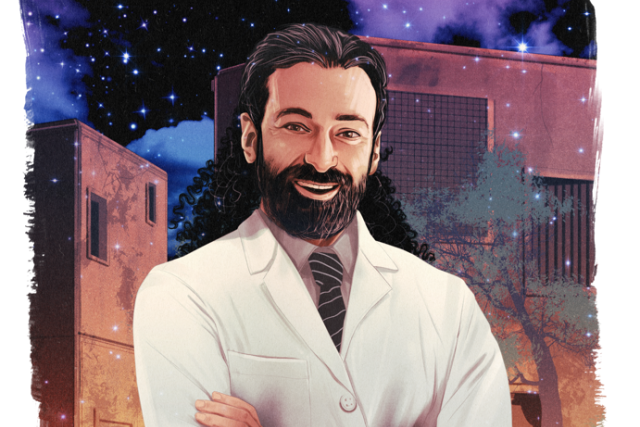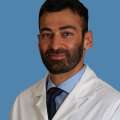Dr. Ramin Salehi-Rad Steps into the U Magazine Spotlight
Within two years of leaving his native Iran as a teenager, Ramin Salehi-Rad, MD ’11 (RES ’14, FEL ’17), PhD ’09, assistant professor of medicine, was enrolled at UCLA, where he earned his undergraduate, MD and PhD degrees. “I came from an environment where questioning and discourse was not possible — there was one narrative that was forced on people. I came to UCLA, and I was challenged by my professors and exposed to diverse thought, and it really forced me to think and become a better person,” he says. Today, as a physician-scientist, Dr. Salehi-Rad is focused on basic and translational research to understand mechanisms that lead to development of lung cancer and create new immunotherapies to overcome resistance to treatment, as well as studies to improve early detection and increase chances to disrupt disease progression.
Whend id you first start to think about science?
As a kid, I always asked a lot of questions and I had a lot of curiosity about why things happen. Thinking about science broadly, it asks questions about why things happen, so I think I’ve always been drawn to science.
What was your first experiment?
I grew up in Iran, and we didn’t really have laboratory resources in school to conduct our own experiments. But in high school, our teacher demonstrated a chemistry experiment with hydrogen peroxide to create a foam, and I was fascinated by that. It wasn’t until I came to the United States that I had a chance to work in a lab and do my own experiments. I was drawn to chemistry, specifically organic chemistry — generating new molecules that never existed before, breaking bonds, making new bonds — and that is why I got my PhD at UCLA.
What has been the greatest challenge in your work?
The greatest challenge in doing research in lung cancer is the complexity and heterogeneity of disease within individual patients, as well as in between patients, which makes it very difficult to develop treatments that can apply broadly.
Where does your inspiration come from?
I have a drive and a passion to try to understand why things happen, which has drawn me to research. And I have a strong desire to help people, and that is what has drawn me to medicine. The combination of the two has led to my career as a physician-scientist.
What has been your biggest "AHA!" moment?
The biggest “aha” moment was when I first recognized my inner voice. Before that, I was very driven by goals. I came to the United States and had to learn English and was focused on doing well in school, and I don’t think I had the necessary time or space to be introspective. But as I got older and settled into this new society, I became fascinated as an undergraduate with free will, and I read a lot about that and about meditation and mindfulness. I think that’s been really transformative for me, both for my personal life and my professional life. It has made me a better, kinder person.
What is your greatest virtue?
I think I’m pretty focused on trying to make sure people around me are okay and happy. I’ve been fortunate in my life to have a lot of friends, and that extends to work, as well. There is a lot of goodwill, and as a result I’ve had a lot of collaborations that have been very fruitful.
What is your greatest fault?
Distractibility, and not being able to say no to things that take my focus away from the things that matter the most.
Whom do you most admire?
Dr. Steven Dubinett [RES ’84, former chief of pulmonary medicine and current dean of the David Geffen School of Medicine at UCLA]. The greatest decision I’ve made in my academic career was to join his lab. He is a world-renowned scientist with many collaborations, and, as chief of pulmonary medicine at UCLA, he led so many important research projects related to lung cancer. But more importantly, for me, just watching him as a leader and seeing his kindness, his generosity and his commitment to the people he works with has been so important. I’ve learned so much from him about how to create a work environment that’s not just productive, but also happy.
If not a scientist, what would you be?
An economist. I really admire economists, and I gravitate toward those like Glenn Loury at Brown who apply economic methodologies to social issues. I would love to be an economist.
What is your most treasured possession?
It is a painting that my uncle in Iran drew of a village in Iran. He passed away two years ago, and I framed it, and I really like it.
To which superhero do you most relate?
Friends, my nieces and different independent sources who have ascribed to me a superhero persona all say it’s Rocket Raccoon from Guardians of the Galaxy. And I will say that I relate to this character. He is very loyal to his friends, and he’s also defined by his humor and his ability to make light of challenging situations. That feels like it somewhat mimics my life.
What are you most compulsive about?
I’m pretty compulsive about a lot of things, that’s the problem.
How do you want to change the world?
I’ve been doing science long enough to be humbled by it and to know it is a very slow and incremental process, and one can only hope to contribute a little bit. Ideally, maybe, I hope that the discoveries we make can contribute pieces to the puzzle that in the future will come into view and lead to new therapies or prevent development of cancer. I don’t have a grand vision of how I want to change the world; it’s the cumulation of individual, small achievements.
What is your definition of happiness?
That’s been a question I think I’ve struggled with my whole life. I think it is when I’m able to align my life with my values.
What is your definition of misery?
When I feel restricted or don’t have the freedom to do or say what I really want to do or say.




